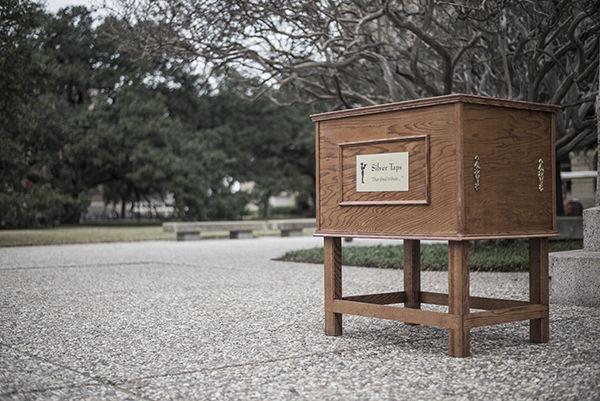When I was assigned to write my first Silver Taps obituary, my editor said it would be my worst and best experience as a writer. He was right.
I’ve never had to deal with the death of someone close to me before, and for the first obituary I wrote, I didn’t know how to cope with the task of speaking with others who were. But that’s what happens when you write an obituary, you dwell on the effects of death in the form of scribbled-down notes and choked-up voices on audio recordings — you leave the project changed.
Every article leaves you with a strange ache to have met the honoree. It’s an odd feeling.
Now every Silver Taps I can’t help but wonder what I would do if someone so close to me died, namely if my sister Kim weren’t around. I have to stop the thoughts soon after they start rolling. It’s too painful, and it doesn’t even come close to what these families feel.
There are a lot of things that make the task of writing a Silver Taps story difficult. For me, the hardest part is hearing tears through the phone. How do you respond to such obvious pain? I have neither the right nor the ability to play counselor during these interviews, but stepping in at the aftermath of a disaster and knowing that there is nothing I could ever do to stop the storm is the most disempowering lesson life has yet to teach me.
After the interviews comes the process of organizing the information. While I may feel like I have an understanding of the deceased through conversations with loved ones, in the end there is a limit to how much I will ever be able to know this person, how
much anybody else will be able to know about this person.
At The Battalion, we write these articles for the central purpose of filling this gap as much as possible by informing students about our fallen Aggies, but in part we compile the information for the families and friends of the honorees, all of whom surely have different expectations for how to represent the deceased.
By the second obituary I wrote, I began to notice friends and family often said the Aggie in question was always smiling, and it began to infuriate me.
It wasn’t so much that they said it, it was that they made it out to be the Aggie’s defining characteristic.
Everyone smiles. These people are more than their enthusiasm. These people were unique, but to the people closest to them, smiling seemed to be the best they could come up with. I selfishly feared that if I died, that’s all it would boil down to.
Nice girl. Always smiling.
It took a while to realize that when you ask someone what they remember most about a true friend, they don’t remember their grades, their athletic prowess, their artistic abilities or the hours logged in community service. They first remember how that person made them feel.
When the first thing people remember about you is that you always smile, it doesn’t necessarily mean that you smile more than the next person, it means you make them feel joy — it means you are a light in their life.
I learned there is a difference in the responses from friends and family members who wanted to email in their thoughts on the deceased and those who agreed to speak with me.
In emails, honorees were described in terms of their religion more frequently, as if the friend or family member was trying to provide a benchmark, a moral standard. A devout Christian. Always smiling.
On the phone or in person, people would also tell me of the little moments, the subtle moments that were so inexplicably special, the minor moments that added up to a lifetime of character. Typed up, the idea that the deceased always showed up to lab first or used to break out into song and dance in the passenger seat of a car seems unrepresentative of that person as a whole.
In times like these, we are limited by language.
When we talk of the deceased, we are describing the shadows of lives on a cave wall. Our words fall flat. Family members of the deceased would say their loved ones were always smiling, but there was so much hidden behind that, so much words cannot express.
Asking someone to share the story of another for a Silver Taps article is asking them to take years of memories and package them into a conversation, which will in turn be packaged into a smaller text form by a stranger. The request is overwhelming.
It’s a request I’ve never had to answer, but standing there in the dark with my fellow Aggies, I consider it.
Kim is a lot of things to me. She was my protection from bullies in elementary school, my cool older sister in middle school, my closest confidant in high school and my endless bank of advice in college.
But all I could think of at Silver Taps was how Kim always smiles.
Aimée Breaux is an applied mathematical sciences junior and managing editor for The Battalion.
Writing Silver Taps obits tests the limits of language
December 2, 2014

Photo by File
Silver Taps
0
Donate to The Battalion
Your donation will support the student journalists of Texas A&M University - College Station. Your contribution will allow us to purchase equipment and cover our annual website hosting costs.








